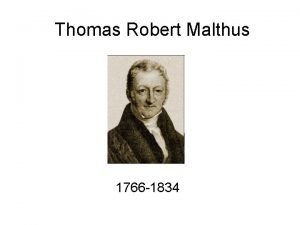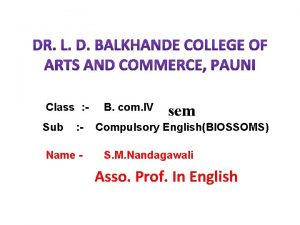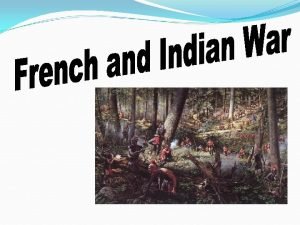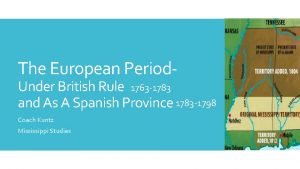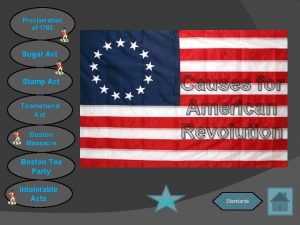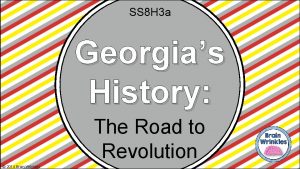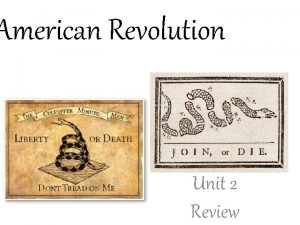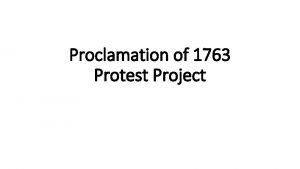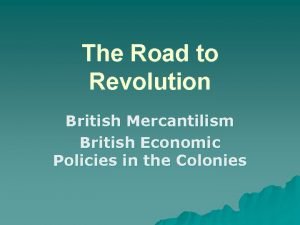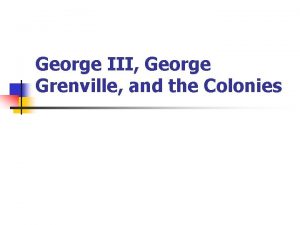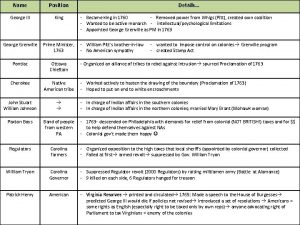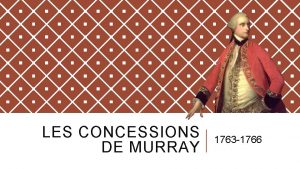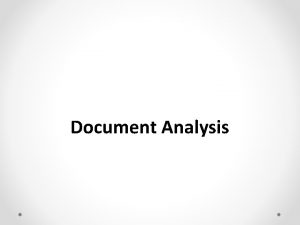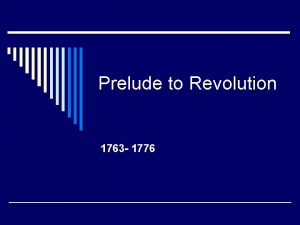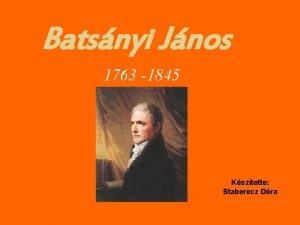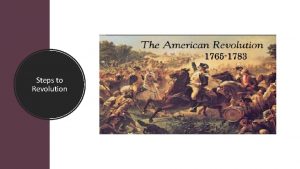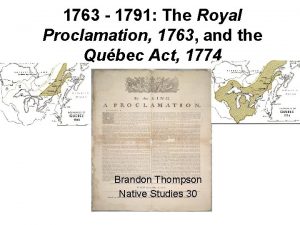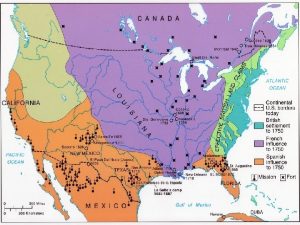The Leaders 1763 1766 George 111 George Grenville













- Slides: 13

The Leaders 1763 -1766

George 111

George Grenville PM 1763 -5 While Prime Minister, his government oversaw the prosecution of John Wilkes and the passing of the American Stamp Act 1765, which led to the first disagreements between American colonies and Great Britain that lead to the American Revolutionary War. After several months of being Prime Minister, he began to have disagreements with young king George III. The king started to think that the Prime Minister was using him as a puppet. The king convinced Rockingham to become the new Prime Minister and Grenville never held an office again.

James Otis, Jr. 1725 – 1783 was a lawyer in colonial Massachusetts who was an early advocate of the political views that led to the American Revolution. The phrase "Taxation without Representation is Tyranny" is usually attributed to him. He wrote your Doc 1 The Rights of the British Colonies Asserted and Proved in 1764

Andrew Oliver 1706 -1774 Andrew Oliver was a Massachusetts politician. Andrew graduated from Harvard College in 1726. Oliver was the man commissioned to enforce the Stamp Act in Massachusetts. However, Oliver was forced to resign after repeated violence from the colonists in Boston an effigy of him was hung up at the future Liberty Tree on August 14, 1765 by Boston's "The Loyal Nine” and that night his Boston house was ransacked by the Sons of Liberty. On August 15 th he resigned his commission, and was made to resign again publicly when the stamps actually arrived in Boston. He was brother of Massachusetts Justice Peter Oliver and nephew of Governor Jonathan Belcher. He served as Lieutenant-Governor under his brother-in-law, Thomas Hutchinson, and died in office.

Sam Adams Born: September 27, 1722 Died: October 2, 1803 Family: Married 1) Elizabeth Checkley (d. 1750); two children 2) Elizabeth Wells; no children Samuel Adams was an outspoken, active, and radical leader of the anti-British agitation in Massachusetts in the 1760 s and 1770 s, and an early supporter of independence from Great Britain. He helped organize the Sons of Liberty in 1765, the Committees of Correspondence in 1772, and was the leading force behind the Boston Tea Party of 1773. He was a delegate to the Continental Congress in 1774 -1781, lieutenant governor (1789 -1793), and governor (1794 -1797) of Massachusetts.

Thomas Hutchinson Chief Justice of Mass in 1765

Patrick Henry was elected to the House of Burgesses (the legislative body of the Virginia colony) in 1765. That same year, he proposed the Virginia Stamp Act Resolutions. The freshman representative waited for an opportunity where the mostly conservative members of the House were away (only 24% was considered sufficient for a quorum). In this atmosphere, he succeeded, through much debate and persuasion, in getting his proposal passed. It was possibly the most anti-British (many called it "treasonous") American political action to that point, and some credit the Resolutions with being one of the main catalysts of the Revolution. The proposals were based on principles that were well established British rights, such as the right to be taxed by one's own representatives. They went further, however, to assert that the colonial assemblies had the exclusive right to impose taxes on the colonies and could not assign that right. The imputation of treason is due to his inflammatory words, "Caesar had his Brutus; Charles the First his Cromwell; and George the Third —" [Cries of "Treason!"] "George the Third may profit by their example. If this be treason, make the most of it. "

Patrick Henry's "Treason" speech before the House of Burgesses in an 1851 painting by Peter F. Rothermel According to biographer Richard Beeman, the legend of this speech grew more dramatic over the years. Henry probably did not say the famous last line of the above quote, i. e. "If this be treason, make the most of it. " The only account of the speech written down at the time by an eyewitness (which came to light many years later) records that Henry actually apologized after being accused of uttering treasonable words, assuring the House that he was still loyal to the king. Nevertheless, Henry's passionate, radical speech caused quite a stir at the time, even if we cannot be certain of his exact words.

William Pitt PM 1757 -61, 1766 -8 Speech against Stamp Act 1765 WHIG

Edmund Burke 1729 – 97 Whig Was an Irish statesman, author, orator, political theorist and philosopher, who served for many years in the British House of Commons as a member of the Whig party. He is mainly remembered for his support of the American colonies in the dispute with King George III and Great Britain that led to the American Revolution and for his strong opposition to the French Revolution.

Ben Franklin in London in 1765 • • • In 1757, he went to England to represent Pennsylvania in its fight with the descendants of the Penn family over who should represent the Colony. He remained in England to 1775, as a Colonial representative not only of Pennsylvania, but of Georgia, New Jersey and Massachusetts as well. Early in his time abroad, Franklin considered himself a loyal Englishman. England had many of the amenities that America lacked. The country also had fine thinkers, theater, witty conversation — things in short supply in America. He had thoughts of staying there permanently. In 1765, Franklin was caught by surprise by America's overwhelming opposition to the Stamp Act. His testimony before Parliament helped persuade the members to repeal the law

Charles Watson-Wentworth 2 nd Marquess of Rockingham PM 1765 -66, 1782 WHIG
 Thomas robert malthus (1766-1834)
Thomas robert malthus (1766-1834) 110 000 110 111 000 111
110 000 110 111 000 111 Tectonisml
Tectonisml Leeds grenville lanark population
Leeds grenville lanark population Grenville province geology
Grenville province geology Stay calm poem by grenville kleiser
Stay calm poem by grenville kleiser Ohio river valley 1763
Ohio river valley 1763 Under british rule, 1763-1783
Under british rule, 1763-1783 Proclamation of 1763
Proclamation of 1763 Proclamation of 1763 caricatures
Proclamation of 1763 caricatures What did the proclamation of 1763 forbid
What did the proclamation of 1763 forbid Quartering act definition
Quartering act definition Proclamation of 1763 protest poster
Proclamation of 1763 protest poster Navigation acts 1763
Navigation acts 1763
